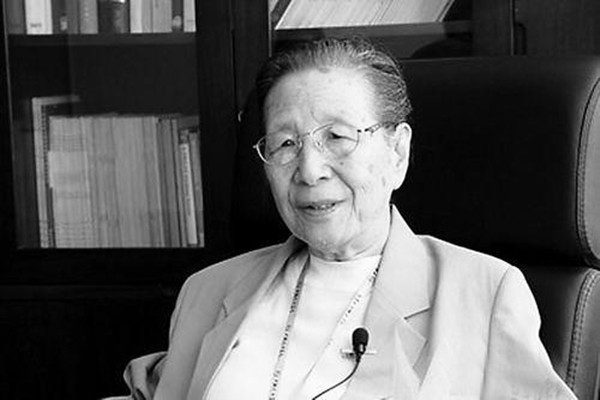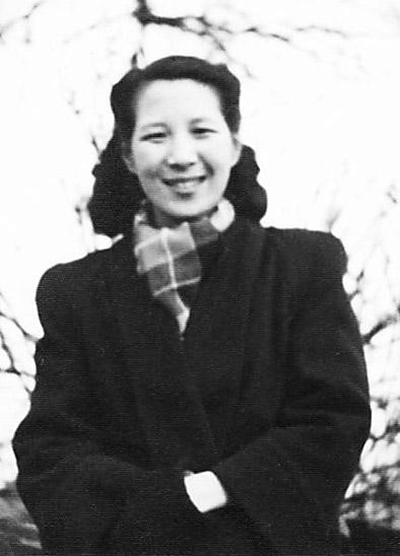Academician Xia Peisu: She became an eternal legend
Xia Peisu regarded meeting Hua Luogeng as a turning point in her life, and for her students, meeting her is also a turning point in their lives.

Elderly Xia Peisu [Photo/mmcs.org.cn]

Young Xia Peisu [Photo/mmcs.org.cn]
On August 27, 2014, Ms. Xia, a well-known computer expert and educator, a pioneer of computer research and one of the important founders of China's computer industry, a research fellow at the Institute of Computing Technology of the Chinese Academy of Sciences, and a CAS academician, passed away in Beijing at the age of 91. That day, the web pages of the CAS Institute of Computing Technology were grayed to commemorate the female scientist known as the "mother of Chinese computers".
Determined to save the nation
In 1923, Xia was born into a family of educators. This growth environment laid a solid foundation for the young Xia in ancient literature and mathematics. Xia showed her talent for mathematics during her childhood. She could even solve mathematical problems puzzling her teacher, which greatly stimulated her interest in mathematics.
During the War of Resistance Against Japanese Aggression, Xia in her teens witnessed the war-torn land and the poverty-stricken people. Filled with extreme indignation, she made up her mind to apply for a technical college in order to devote herself to industry and save the nation through industrialization when growing up.
After graduating from high school, Xia was admitted to the National Central University (renamed Nanjing University in 1949) in Chongqing, where she discovered her strengths and interests. She was particularly interested in the transient analysis of alternating current circuits, which later contributed significantly to her computer R&D efforts.
In October 1945, Xia was recommended to the Institute of Telecommunications at Jiaotong University Chongqing Campus for graduate study. Two years later, Xia was admitted by the Department of Electrical Engineering at the University of Edinburgh as a PhD student, and in July 1950, she earned her PhD degree. In 1951, at the age of 28, Xia became a postdoctoral fellow at the University of Edinburgh. The project experience there laid a solid foundation for her later research and design work on computer circuits.
Affectionate to computer
"In one's life, there are some turning points that change one's fate. For me, the critical point fell on an evening in the autumn of 1952, when I met Professor Hua Luogeng for the first time," Xia recalled in an interview.
After returning to China, Xia was appointed as an assistant researcher and associate research fellow in the Telecommunications Network Research Office of the Department of Electrical Engineering of Tsinghua University.
In 1952, Hua, director of the Institute of Mathematics of the Chinese Academy of Sciences, proposed to develop electronic computers in China and intended to select three telecommunications and electronics technicians from the Department of Electrical Engineering of Tsinghua University. Xia , who was 29 years old then, was selected. This marked the beginning of her pioneering work in China's computing technology and her indissoluble relationship with China's computer industry.
To enable more people to understand computers, in 1955, Xia began compiling teaching materials on computer principles. At that time, some basic terms and terminologies on computers were only in English. During her compilation, she deliberated and translated the professional terms into Chinese, which have been used throughout the country to this day.
Not only that, in March 1956, Xia founded a computer principles workshop to teach basic computer knowledge, which is believed to be the first of its kind in China.
China's first independently-designed general-purpose electronic digital computer - the 107 machine; Chinese Journal of Computers; Journal of Computer Science and Technology; CAS Institute of Computing Technology; School of Computer Science and Technology, University of Science and Technology of China ... The birth of each was inseparable from Xia's efforts.
In 2011, the China Computer Federation (CCF) granted Xia the first Lifetime Achievement Award, recognizing her contributions to China's computer industry. To commemorate the 50th anniversary of her computer career, the first Loongson processor chip was named "Xia 50".
A mentor for life
Xia regarded meeting Hua as a turning point in her life, and for her students, meeting her is also a turning point in their lives. The University of Science and Technology of China (USTC) was established by CAS in 1958. Xia was responsible for setting up the university's computer science and technology department and made painstaking efforts in the work. In the development history of the USTC, Xia was recognized as the initiator and founder of its computer science and technology development.
"Ms. Xia is both a generous elder and a mentor of life," said Tang Zhimin, a disciple of Xia and research fellow at the CAS Institute of Computing Technology. In 1985, Tang accidentally and fortunately became a student of Xia. Over the past 30 years, they had maintained both a close master-apprentice relationship and a good friendship. In Tang's eyes, Xia was a generous and considerate teacher. "When a student starts his graduate program, she doesn't immediately require him to join her project. Instead, she asks the student about his ideas and requirements and then prepares conditions for his own innovation," Tang recalled.
Xia not only guided graduates in scientific research based on their abilities and interests but also set herself as an example in nurturing good scientific ethics. Her graduates often publish papers at international conferences and journals. She never allowed them to attach her name to their publications even when she did much revision for them. If she hadn't done substantive work, she would never add her name to the project. Her spirit of seeking truth from facts had a great impact on students.








